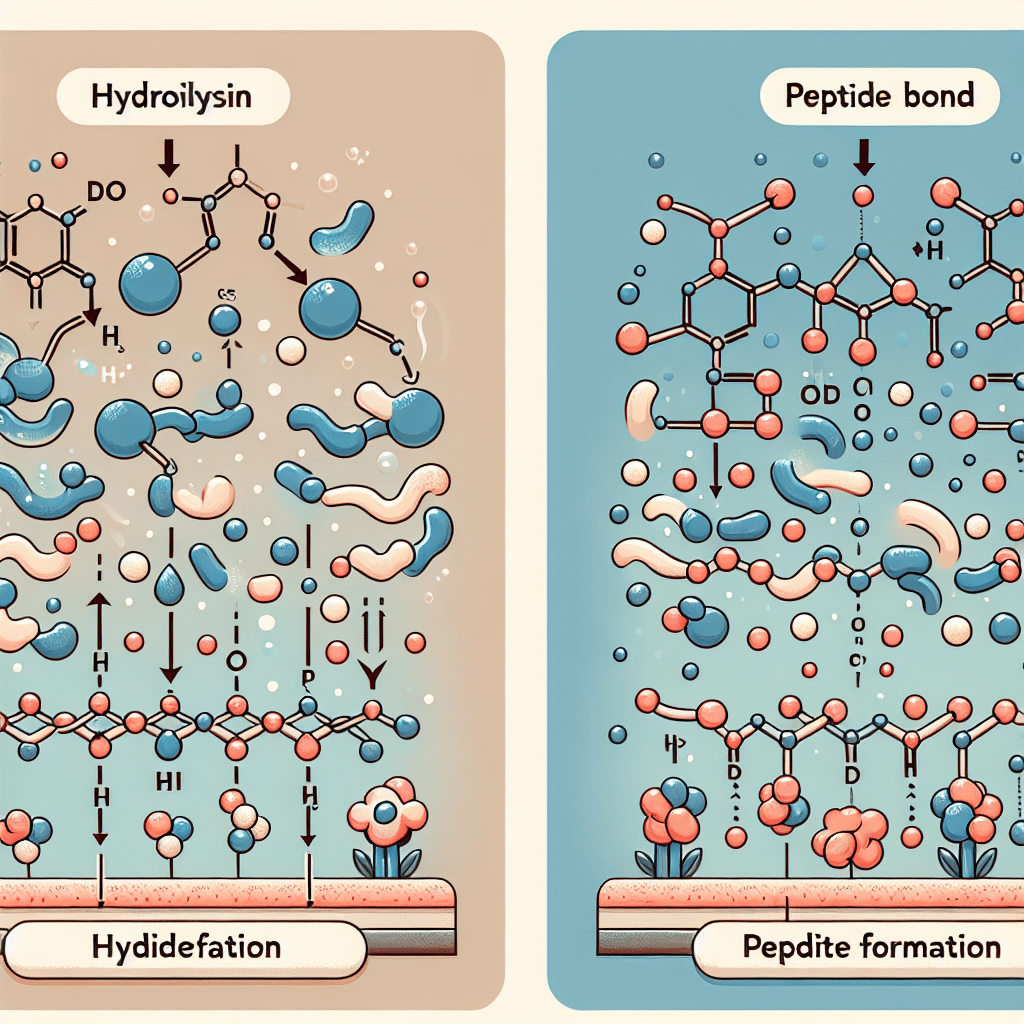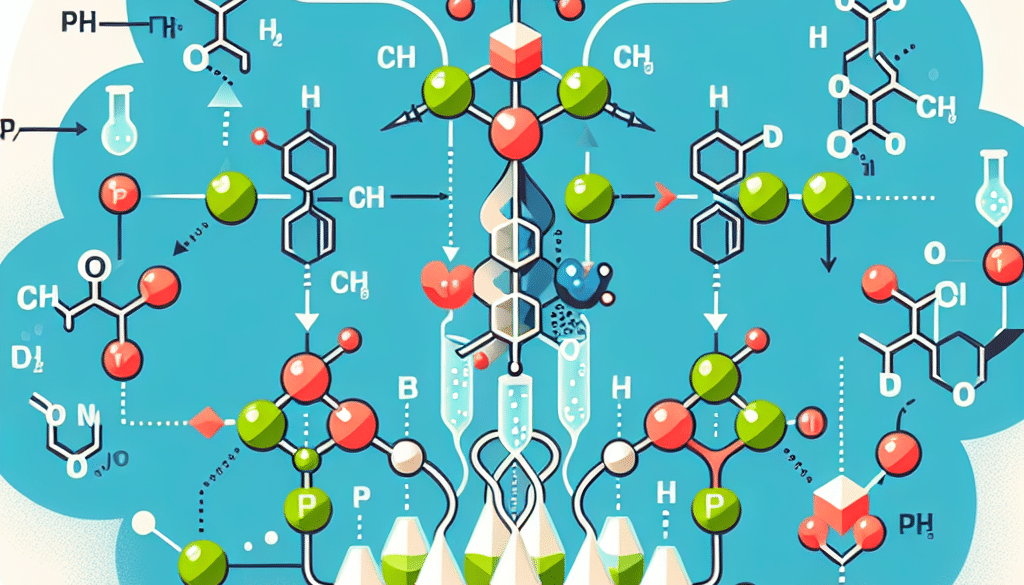Is Hydrolyzed The Same As Peptides?
-
Table of Contents
Hydrolyzed Proteins vs. Peptides: Understanding the Differences

In the world of nutrition and biochemistry, terms like “hydrolyzed proteins” and “peptides” often come up in discussions about dietary supplements, skincare products, and medical treatments. While these terms are sometimes used interchangeably, they refer to distinct concepts with specific implications for health and industry applications. This article will delve into the differences between hydrolyzed proteins and peptides, their production processes, and their roles in various sectors.
What Are Hydrolyzed Proteins?
Hydrolyzed proteins are proteins that have been broken down into smaller chains of amino acids or individual amino acids through a process called hydrolysis. This process involves the addition of water to break the peptide bonds that hold the amino acids together in the protein structure. Hydrolysis can be achieved through various methods, including enzymatic hydrolysis, acid hydrolysis, or alkaline hydrolysis.
- Enzymatic hydrolysis uses specific enzymes to target peptide bonds, resulting in a controlled breakdown of the protein.
- Acid hydrolysis involves the use of strong acids, such as hydrochloric acid, to cleave the peptide bonds.
- Alkaline hydrolysis uses strong bases, like sodium hydroxide, to achieve the same result.
The degree of hydrolysis can vary, leading to different lengths of peptide chains and varying levels of bioavailability and functionality.
What Are Peptides?
Peptides are short chains of amino acids linked by peptide bonds. They are essentially smaller versions of proteins and can range from dipeptides, which contain two amino acids, to polypeptides, which can consist of up to fifty amino acids. Peptides play numerous roles in the body, acting as hormones, neurotransmitters, growth factors, and natural antibiotics, among other functions.
Peptides can be naturally occurring or synthetically produced. They are often used in pharmaceuticals, cosmetics, and dietary supplements due to their targeted biological activities and ease of absorption by the body.
Is Hydrolyzed the Same as Peptides?
While hydrolyzed proteins and peptides are related, they are not the same. Hydrolyzed proteins are the result of the hydrolysis process, which breaks down proteins into smaller peptides and amino acids. Peptides, on the other hand, refer to the specific structure of short amino acid chains, regardless of how they were produced.
Here are some key differences:
- Composition: Hydrolyzed proteins can contain a mixture of different-sized peptides and free amino acids, while peptides are defined by their specific number of amino acids.
- Production: Peptides can be formed naturally in the body or synthesized in a lab, whereas hydrolyzed proteins are always the result of a hydrolysis process.
- Functionality: Due to their smaller size, peptides often have more specific functions and are more easily absorbed than hydrolyzed proteins, which may still contain larger peptide chains.
Applications of Hydrolyzed Proteins and Peptides
Both hydrolyzed proteins and peptides have a wide range of applications across different industries. Here are some examples:
- Nutrition and Health Supplements: Hydrolyzed proteins, such as whey or collagen, are popular in dietary supplements for muscle recovery and skin health. Peptides like creatine peptides and collagen peptides are also used for their specific health benefits.
- Pharmaceuticals: Peptides are used in medications due to their biological activity and potential for treating various conditions, such as diabetes (insulin) and multiple sclerosis (interferon beta-1a).
- Cosmetics: Peptides are common in skincare products for their anti-aging, firming, and hydrating properties. Hydrolyzed proteins can also be found in hair care products to strengthen and repair damaged hair.
Case Studies and Statistics
Research has shown the benefits of both hydrolyzed proteins and peptides in various applications. For instance, a study published in the Journal of Sports Science & Medicine found that hydrolyzed collagen supplementation improved joint pain in athletes. Another study in the International Journal of Cosmetic Science reported that a specific peptide improved skin elasticity and reduced wrinkles.
Statistics from the dietary supplement industry indicate a growing demand for both hydrolyzed proteins and peptides. The global collagen market, which includes hydrolyzed collagen, is expected to reach $6.63 billion by 2025, according to a report by Grand View Research.
Conclusion: Key Takeaways
In summary, while hydrolyzed proteins and peptides are interconnected, they are not identical. Hydrolyzed proteins are produced through the hydrolysis of larger proteins into smaller peptides and amino acids. Peptides are short chains of amino acids that can be naturally occurring or synthetically produced. Both have unique properties and applications in nutrition, medicine, and cosmetics.
Understanding the differences between hydrolyzed proteins and peptides is crucial for consumers and industry professionals alike, as it informs product development, marketing, and usage. Whether for health supplements, pharmaceuticals, or skincare, the specific characteristics of hydrolyzed proteins and peptides can be harnessed for targeted benefits.
Discover ETprotein’s Premium Protein Products
If you’re looking for high-quality protein products, ETprotein offers an extensive range of organic bulk vegan proteins and L-(+)-Ergothioneine (EGT) suitable for various industries. Their products, including organic rice protein, pea protein, and various seed proteins, are characterized by a neutral taste, non-GMO, and allergen-free attributes. With purity levels exceeding 98%, ETprotein caters to nutraceutical, pharmaceutical, cosmeceutical, and food and beverage sectors worldwide.
For tailored protein powder solutions and nutritional supplements, ETprotein is a trusted partner for leading global brands. To explore their offerings and how they can meet your protein needs, contact ETprotein and email sales(at)ETprotein.com today.
About ETprotein:
ETprotein, a reputable protein and L-(+)-Ergothioneine (EGT) Chinese factory manufacturer and supplier, is renowned for producing, stocking, exporting, and delivering the highest quality organic bulk vegan proteins and L-(+)-Ergothioneine. They include Organic rice protein, clear rice protein, pea protein, clear pea protein, watermelon seed protein, pumpkin seed protein, sunflower seed protein, mung bean protein, peanut protein, and L-(+)-Ergothioneine EGT Pharmaceutical grade, L-(+)-Ergothioneine EGT food grade, L-(+)-Ergothioneine EGT cosmetic grade, L-(+)-Ergothioneine EGT reference grade and L-(+)-Ergothioneine EGT standard. Their offerings, characterized by a neutral taste, non-GMO, allergen-free attributes, with L-(+)-Ergothioneine purity over 98%, 99%, cater to a diverse range of industries. They serve nutraceutical, pharmaceutical, cosmeceutical, veterinary, as well as food and beverage finished product distributors, traders, and manufacturers across Europe, USA, Canada, Australia, Thailand, Japan, Korea, Brazil, and Chile, among others.
ETprotein specialization includes exporting and delivering tailor-made protein powder and finished nutritional supplements. Their extensive product range covers sectors like Food and Beverage, Sports Nutrition, Weight Management, Dietary Supplements, Health and Wellness Products, and Infant Formula, ensuring comprehensive solutions to meet all your protein needs.
As a trusted company by leading global food and beverage brands and Fortune 500 companies, ETprotein reinforces China’s reputation in the global arena. For more information or to sample their products, please contact them and email sales(at)ETprotein.com today.












